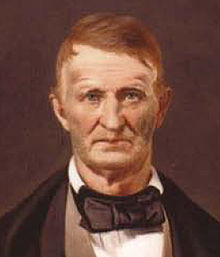Isaac Blackford | |
|---|---|
 Isaac Blackford from Who-When-What Book, 1900 | |
| Presiding Judge of the Court of Claims | |
| In office 1858–1859 | |
| Preceded by | John Gilchrist |
| Succeeded by | Edward G. Loring |
| Judge of the Court of Claims | |
| In office March 3, 1855 – December 31, 1859 | |
| Appointed by | Franklin Pierce |
| Preceded by | Seat established by 10 Stat. 612 |
| Succeeded by | James Hughes |
| 2nd Indiana Supreme Court Chief Justice | |
| In office September 10, 1817 – January 3, 1853 | |
| Preceded by | John Johnson |
| Succeeded by | Andrew Davison |
| Speaker of the Indiana House of Representatives | |
| In office December 16, 1816 – December 19, 1817 | |
| Personal details | |
| Born | Isaac Newton Blackford November 6, 1786 Bound Brook, New Jersey |
| Died | December 31, 1859 (aged 73) Washington, D.C. |
| Resting place | Crown Hill Cemetery Indianapolis, Indiana |
| Political party | Democratic-Republican Whig |
| Education | Princeton University read law |
Isaac Newton Blackford (November 6, 1786 – December 31, 1859) was the second Chief Justice of the Indiana Supreme Court, the court's longest serving Justice, and among the longest serving jurists in the history of the United States. He wrote an eight-volume work entitled Blackford's Reports recording all the early decisions of the court. The books became a staple legal source among Indiana's lawyers and received national and international acclaim for their style, accuracy, quality, and concision in dealing with common law. As a jurist, Blackford was the most influential ever to serve on Indiana's courts, according to former Chief Justice of Indiana Randall Shepard. He was nicknamed the "Indiana Blackstone" because of a comment made by Washington Irving regarding the popularity of Blackford's books. During his lifetime he was nationally renowned as one of the most prominent jurists in the United States.
After graduating from Princeton University, Blackford moved to the Indiana Territory to practice law in 1812. After holding several civil service positions, he was appointed a circuit court judge but resigned just before the territorial government was dissolved in 1816. Elected as a representative to the first session of the Indiana General Assembly, he was chosen to serve as the first Speaker of the Indiana House of Representatives. Following the death of Indiana Chief Justice John Johnson in 1817, Blackford was appointed as his replacement by Governor of Indiana Jonathan Jennings. Blackford's early important cases included Polly v. Lasselle, the decision in that case freed all slaves in Indiana. Nominated without his knowledge or permission, in 1825 he was the Whig candidate for Governor of Indiana, but was defeated in the election because of his refusal to campaign publicly. Again nominated without his knowledge to become a United States senator, he lost the election in the Indiana General Assembly by only one vote.
Blackford was beset by a number of personal tragedies during the 1820s. Following the death of his wife in childbirth, his young son a few years later, his mother's death, and then narrowly escaping death himself, he became emotionally distraught. He began to live a reclusive lifestyle in a one-room apartment in the Indiana Governor's Mansion, where he remained for over twenty years. There he spent his time with only the companionship of his servant. He left for occasional meals, to attend court sessions, and rarely for business and church, but otherwise remained locked away. It was during his solitude that he began writing the reports for which he became renowned.
He was reappointed to his seat on the Supreme Court four times, serving until the adoption of the 1851 Constitution of Indiana, which made his position subject to election rather than appointment. Defeated for the Whig party nomination to run for his office, he left the court in 1852. He was defeated again in the 1853 election to become Supreme Court Reporter, which led him to seek a position on the federal courts after briefly attempting to practice law. Appointed by President Franklin Pierce, he served as a judge of the newly created Court of Claims dealing with financial claims against the federal government from 1855 until his death. During his lifetime Blackford accumulated a small fortune through the sale of his reports which was left to his only living relative, his half-sister Charlotte Teresa Coons.
© MMXXIII Rich X Search. We shall prevail. All rights reserved. Rich X Search
